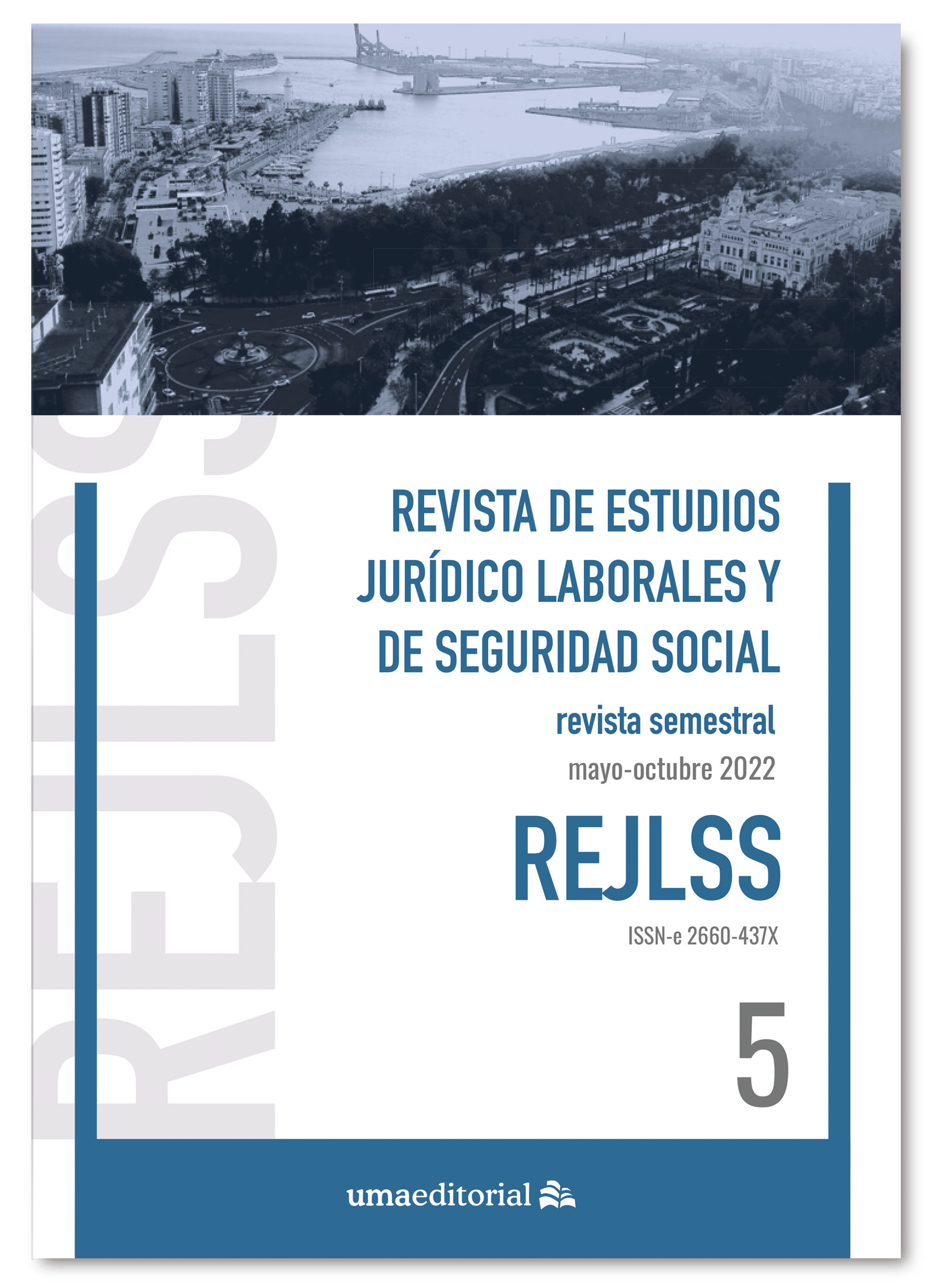Prohibition of concurrence and ultra-active validity of collective agreements
DOI:
https://doi.org/10.24310/rejlss.vi5.14698Keywords:
collective agreement, prohibition of competition, validity, ultraactivityAbstract
The reform of collective bargaining, introduced by Royal Decree-Law 32/2021, of 28 December, in the area of the prohibition of concurrence and ultra-activity of collective agreements, determines a renewed interest in a classic interpretative question, the validity of this prohibition during the ultra-activity phase of a collective agreement. For this reason, the Supreme Court’s doctrine on the subject is analysed, not only the general criterion echoed in the STS of 5 October 2021, but also the doctrine of the impermeability of the bargaining unit during the ultraactivity of the collective agreement, for the purposes of proposing a jurisprudential doctrine, in accordance with the characteristics of the new legal model for the organisation of collective bargaining, following RDL 32/2021. The complexity and transcendence of the issue make it advisable to propose a judicial doctrine with nuances in its interpretation of articles 84.1 LET and 86.3 LET.
Downloads
Metrics
Publication Facts
Reviewer profiles N/A
Author statements
Indexed in
-
—
- Academic society
- N/A
- Publisher
- Universidad de Málaga. UMA Editorial
References
Benavente Torres, M.I., “Aportaciones al debate sobre la ultraactividad”, Revista Española de Derecho del Trabajo, núm. 171, 2014.
Fernández López, M.ª F., “Reformas normativas y vigencia de los convenios colectivos”, Rodríguez-Piñero y Bravo-Ferrer, M., y Valdés Dal-Ré, F., La reforma laboral de 2012 en materia de negociación colectiva, La Ley, Madrid, 2012.
García Salas, A. I., “La prohibición de concurrencia durante la ultraactividad de un convenio colectivo”, Revista de Información Laboral, núm. 7, 2016.
Lahera Forteza, J., La negociación colectiva tras la reforma laboral de 2021, Tirant lo Blanch, Valencia, 2022.
Molina Navarrete, C., “Retorno normativo a la ultraactividad indefinida”, Temas Laborales, núm. 161, 2022.
Sáez Lara, C., “Concurrencia entre convenios y modernización de la negociación colectiva”, Temas Laborales, núm. 161, 2022.
Sáez Lara, C., «La concurrencia de convenios colectivos», en Camps Ruiz, L. M.; Ramírez Martínez, J. M. y Sala Franco, T. (coordinadores), Crisis, reforma y futuro del Derecho del Trabajo, Tirant lo Blanch, Valencia, 2010.
Downloads
Published
How to Cite
Issue
Section
License
In the Revista de Estudios Juridico Laborales y de Seguridad Social (REJLSS) we are clearly committed to a policy of open access to scientific knowledge (See Berlin Declaration).
Those authors who have publications with this journal accept the following terms:
This journal provides immediate free access to its content under the principle of making research freely available to the public. All the contents published in the REJLSS are subject to the Creative Commons license
Attribution-NonCommercial-NoDerivatives 4.0 International (CC BY-NC-ND 4.0)
Copyrights are of two kinds: moral and patrimonial. Moral rights are perpetual, inalienable, non-transferable, inalienable, unattachable and imprescriptible prerogatives. In accordance with Spanish copyright legislation, the authors who publish in REJLSS retain the moral right over their work, as well as the ownership of the patrimonial right, which will be transferred to the University of Malaga for its dissemination in open access.
The patrimonial rights, refer to the benefits that are obtained by the use or disclosure of the works. REJLSS is published in open access and is exclusively authorized to perform or authorize by any means the use, distribution, dissemination, reproduction, adaptation, translation or transformation of the work.
It is the responsibility of the authors to obtain the necessary permissions of the images that are subject to copyright.
Authors whose contributions are accepted for publication in this journal retain the non-exclusive right to use their contributions for academic, research and educational purposes, including self-archiving or depositing in open access repositories of any kind.
The electronic edition of this magazine is edited by the Editorial of the University of Malaga (UmaEditorial), being necessary to cite the origin in any partial or total reproduction.
The authors may adopt other non-exclusive license agreements for the distribution of the version of the published work (eg: deposit it in an institutional telematic archive or publish it in a monographic volume) provided that the initial publication is indicated in this magazine.
Authors are allowed and recommended to disseminate their work through the Internet (eg, in institutional telematic archives or on their website) before and during the submission process, which can produce interesting exchanges and increase citations of the published work.







19.png)
